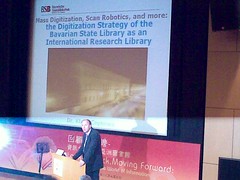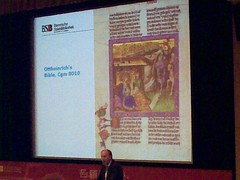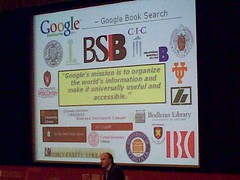"Mass digitization, Scan Robotics, and more: The digitization strategy of the Bavarian State Library as in International Research Library". By Dr. Klaus Ceynowa, Deputy Director General, Bavarian State Library (i.e. the National Library of Bavarian), Germany.

They are 450 years old this year!
They operates 7 days a week, 0800 hours to 2400 hours daily.
See themselves as an "European Universal Library" and an "International research library".
Target audience are researchers, scholars and students -- worldwide.
Rich and deep collections dating back to the 16th century. Most notably its Medieval manuscripts, including an original Gutenberg-pressed bible.

Bavarian state lib has 16,000 oriental & Asian collections. Including Dun Huang manuscripts dating back to 1651.
Their digitisation strategy (i.e. their approach to funding, and collections to be digitised)
For funding, they have decided to partner with Google but only for manuscripts from the 17th and 19th century. Says there is an urgent need to preserve the collections. And only Google has offered that amount of money.

For materials from the 20th and 21st century, Dr. Ceynowa said something about these still being under copyright so they won't be digitised for now (if I got my facts right).
As for their Special Collections, maps, music supplies, these will be digitised in the future, from funding by the European Library (or was it Council)?
They have decided to go for mass "industrial-scale" digitisation, rather than a highly-selective approach. No selective picking. They would scan everything (within the identified collection period) with the aim towards volume.
Main challenge is logistics. They designed a workflow to track every item, at every step of the procedure. And in a manner that doesn't interrupt the normal day-to-day workflow.

They're using something called "ScanRobots", which they jointly developed with a German firm. The machine automatically flips the pages, captures the pages in very high resolution -- two facing pages at the time.

Target is to scan between 1,000 to 2,000 pages daily.
Their partnership with Google
Without revealing any specific contractual details, Dr. Ceynowa shared that Google will complete the digitisation (of the agreed materials) within 10 years, at no cost to their library.
Scanning is done within Bavaria; the materials will not be transported out of their country.
Google and the Bavarian State Library will get digital copies, and the Bavarian State Library will also own the "digital data" (i.e. they have the source digital scans). Their library is subsequently free to provide the scanned documents "via OPAC, website, and the library web services". And they can freely share the object metadata.
The Bavarian State Library is not allowed to give the digital objects away.
The contract is non-exclusive (i.e. Bavarian State Library can choose to scan the same materials with another partner; doesn't mean Google has the exclusive rights to scan the materials).
Future
Dr. Ceynowa ended his keynote speech by saying that they are choosing to be a digital library, rather than a library with the physical objects.
Says to survive in the world of information, libraries have to be a place within the online world.
To that, they have reconstructed their building in SecondLife.
Their premise is that if more people use the digital collections, then more people will eventually find their way to use the physical library.
[Next: Part 5]

Ivan, thanks for sharing this. Seems like they're doing some great work! Few libraries have embarked on such "industrial-scale digitization" with the aim toward volume and access. Good that they're not selectively picking. The decision to acquire the material has already been made. If it's not valuable, why do we
ReplyDeletehave it? If something's useful, people may want it, but only if they know it's there.
Hi Aaron, they are not selectively picking because it would slow down their process. You're right -- the decision to acquire has been made, so it makes sense to concentrate on the digitisation itself.
ReplyDelete